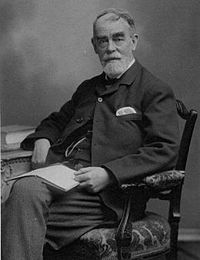Ο Γερμανός ποιητής και μεταφραστής Stefan Anton George (12 Ιουλίου 1868 – 4 Δεκεμβρίου 1933)
Ο Σκωτσέζος δοκιμιογράφος, ευθυμογράφος, και ιστορικός Thomas Carlyle (4 Δεκεμβρίου 1795 – 5 Φεβρουαρίου 1881).
Ο Βρετανός πεζογράφος Samuel Butler (4 Δεκεμβρίου 1835 –18 Ιουνίου 1902) ανέπτυξε μια θεωρία ότι η Οδύσσεια γράφτηκε από μια νέα Σισιλιάνα γυναίκα, και ότι οι σκηνές του ποιήματος απεικόνισαν την ακτή της Σικελίας και των κοντινών νησιών της. Περιέγραψε τα στοιχεία γι’ αυτή τη θεωρία στο The Authoress of the Odyssey (1897) και στην εισαγωγή και τις υποσημειώσεις στη μετάφραση της Οδύσσειας. Ο Butler μετέφρασε επίσης και την Ιλιάδα.
Υπήρξε κι ένας άλλος Βρετανός Samuel Butler (4 Δεκεμβρίου 1612 – 18 Ιουνίου 1680) ο οποίος ήταν ποιητής.
Ο Rainer Maria Rilke (γεννήθηκε στις 4 Δεκεμβρίου 1875 στην Πράγα της τότε Αυστρο-ουγγρικής αυτοκρατορίας – και πέθανε στις 29 Δεκεμβρίου 1926σ’ ένα σανατγόριο της Ελβετίας) θεωρείται ένας από τους μέγιστους ποιητές του 20ού αιώνα της γερμανικής γλώσσας. Η επικοινωνία, η μοναξιά, και η βαθιά ανησυχία για το μέλλον – είναι θέματα που διαπραγματεύεται και που τον τοποθετούν ως συνδετικό κρίκο μεταξύ των παραδοσιακών και νεωτεριστών ποιητών. Έγραψε και ποίηση και πεζογραφία. Δύο διάσημα ποιητικά έργα του είναι τα Sonnets to Orpheus και οι Ελεγείες του Ντουίνο [Duino Elegies]. Από τα πεζογραφικά έργα του ξεχωρίζουν οι Επιστολές σε έναν νέο ποιητή και το ημι-αυτοβιογραφικό Οι σημειώσεις του Μάλτε Λάουριτς Μπρίγκε [Die Aufzeichnungen des Malte Laurids Brigge, The Notebooks of Malte Laurids Brigge]. Έγραψε επίσης περισσότερα από 400 ποιήματα στα γαλλικά, που αφιερώθηκαν στην πατρίδα της επιλογής του, το καντόνι του Valais στην Ελβετία.
 | |
In 1897, Rilke went to Russia, a trip that would prove to be a milestone in Rilke's life, and which marked the true beginning of his early serious works. While there the young poet met Tolstoy, whose influence is seen in Das Buch vom lieben Gott und anderes (Stories of God), and Leonid Pasternak, the nine-year-old Boris's father. At Worpswede, where Rilke lived for a time, he met and married Clara Westhoff, who had been a pupil of Rodin. In 1902 he became the friend, and for a time the secretary, of Rodin, and it was during his twelve-year Paris residence that Rilke enjoyed his greatest poetic activity. His first great work, Das Stunden Buch (The Book of Hours), appeared in 1906, followed in 1907 by Neue Gedichte (New Poems) and Die Aufzeichnungen des Malte Laurids Brigge (The Notebooks of Malte Laurids Brigge). Rilke would continue to travel throughout his lifetime; to Italy, Spain and Egypt among many other places, but Paris would serve as the geographic center of his life, where he first began to develop a new style of lyrical poetry, influenced by the visual arts.
When World War I broke out, Rilke was obliged to leave France and during the war he lived in Munich. In 1919 he went to Switzerland where he spent the last years of his life. It was here that he wrote his last two works, the Duino Elegies (1923) and the Sonnets to Orpheus (1923). He died of leukemia on December 29, 1926. At the time of his death his work was intensely admired by many leading European artists, but was almost unknown to the general reading public. His reputation has grown steadily since his death, and he has come to be universally regarded as a master of verse.
A Selected Bibliography
Poetry
Das Buch der Bilder (The Book of Images) (1902)
Das Marienleben (The Life of the Virgin Mary) (1913)
Das Stunden Buch (Book of Hours) (1905)
Die Sonette an Orpheus (Sonnets to Orpheus) (1923)
Duineser Elegen (Duino Elegies) (1923)
Neue Gedichte (New Poems) (1907)
New Poems (1984)
Poemes Francais (French Poems) (1935)
Rainer Maria Rilke: Selected Poems (1985)
Requiem (1909)
Rilke on Love and Other Difficulties (1975)
Selected Poems of Rainer Maria Rilke (1981)
Späte Gedichte (Later Poems) (1934)
The Complete French Poems of Rainer Maria Rilke (1996)
Prose
Auguste Rodin (1903)
Das Buch vom lieben Gott und anderes (Stories of God) (1900)
Die Aufzeichnungen des Malte Laurids Brigge (The Notebooks of Malte Lourids Brigge) (1910)
Die Weise von Liebe und Tod des Cornet Christopher Rilke (1906)
Letters on Cezanne (1985)
Letters to a Young Poet (1993)
Rilke and Benvenuta: An Intimate Correspondence (1987)
Selected Letters of Rainer Maria Rilke (1960)

1 comment:
Για τη γιορτή σου αύριο, σου εύχομαι Χρόνια Πολλά κι Ετυχισμένα, γεμάτα αισιοδοξία, δημιουργικότητα και στιγμές ευτυχίας.
Με πολλή αγάπη απο το μακρινό Μόντρεαλ
Post a Comment